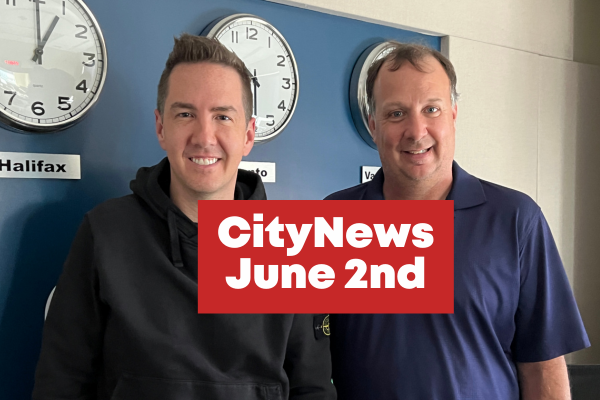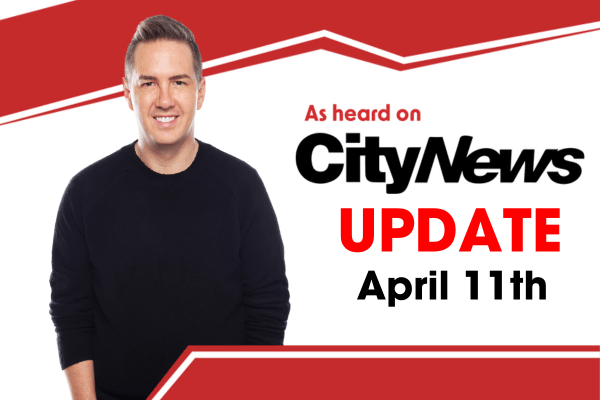Clinton Wilkins joins Global News as they report on the Federal plan for addressing Canada's housing crisis. Included in the report are comments from the Federal Housing Minister Sean Fraser, emphasizing collaboration across all levels of government to improve affordability and accessibility of housing.

CityNews Update – Getting Help In Hardships | June 2nd
Clinton Wilkins joins Todd Veinotte on CityNews 95,7 to address the impact of the recent wildfires in NS on homeowners. The two talk about what Mortgage lenders are doing to help, the importance of asking for a deferral and the impacts on insurance.
Todd Veinotte 00:00
Alright, joining me here in studio is Clinton Wilkins, our mortgage guru, and there’s lots to unpackage when it comes to what’s happening here, Clinton and we were just chatting about it. We talked about three or four massive issues, right?
Clinton Wilkins 00:09
Yep.
Todd Veinotte 00:10
Alright. Yeah so tell us, what are some of the some things from your vantage point from the mortgage side of things, Sagen first of all?
Mortgage lenders are offering deferrals to impacted homeowners
Clinton Wilkins 00:17
Yeah so, Sagen is one of the mortgage insurers in Canada. So obviously, there’s the Canadian Mortgage Housing Corporation, Sagen and Canada Guaranty, and in essence, they all do the same thing. Sagen actually came out midweek through the week, and they said, you know, any of our clients who are insured with Sagen, we will support a six month deferral, for anybody who’s in the impacted areas. Obviously, a lot of people don’t know what the situation is, you know where you live, you know, maybe you’ve lost your home, maybe your home is severely damaged, it’s going to be a long time, you know, for these people to you know, get through the insurance process, figure out what their housing situation is, etc. So I think, you know, with a mortgage insurer, and one of the biggest mortgage insurers in the country coming forward to say, hey, we’re gonna support Canadians, we’re gonna support the people here in this region that are impacted, obviously, is a great step. And I think, you know, anybody who, you know, has been in an impacted area, talk to your lender. Every lender on a case by case basis will do something for someone, Todd. And you know, you know, if you’ve lost your home, or if you’re going to be displaced for a long period of time, talk to your mortgage lender, and you know, they will oftentimes offer you a deferral, regardless if it’s part of the Sagen program or not. Because, you know, lenders don’t want to have a loss. And it’s going to take a long time to work through insurance. And we understand there’s some people who are in financial hardship. Like we’ve heard from some of our clients that might not be in the best financial health, and they’ve been displaced, something’s happened to their home, and they’re waiting for insurance to come. But guess what to go rent an apartment or get a hotel that takes money.
“Ask for help ask the right questions.”
Clinton Wilkins 01:47
So you know, I really encourage, you know, consumers to reach out to their lender. And if you’re dealing with your insurance company, you know, ask the insurance company for an advance on the, you know, the claim money, just say, you know, what, I’m in a bit of financial hardship, I need some money to get, you know, my life going here again. And there’s nothing, not honorable about, you know, asking for help. And, you know, I think everybody’s here to help. And I really encourage anyone, you know, it’s, it’s challenging, if you’re not in your home to get, you know, maybe your paperwork or find out what your mortgage number is, or even get a hold of your mortgage lender. You know, reach out to me or our office. And you know, we’ll certainly point you in the right direction and give you some advice. You know, we deal with mortgage lenders all day, every day. And, you know, we were here through the pandemic, and I think it’s gonna be a very similar type of program that lenders are going to offer to homeowners.
Todd Veinotte 02:32
Yeah, it’s like anything, it’s tough, because people are incredibly stressed right now. And I’m sure that it’s hard to get a hold of some of these people, right?
Clinton Wilkins 02:39
And sometimes it’s the last thing on your mind. It’s like, oh, my mortgage, right? Well, you need to pay for housing somewhere. Yeah, luckily, there are some shelters and things set up. Or maybe you’re living with friends or family. But what’s the long term solution? And I think that that’s something that people need to start thinking about now that hopefully the dust will start settling. And, you know, I think your financial future obviously can be impacted. If you’re still paying a mortgage on a home that you’re not living in, that can have significant financial impacts to family. So I think, you know, ask for help ask the right questions.
Todd Veinotte 03:09
Right, but you have to continue paying that mortgage, right?
The first step is to ask for a deferral
Clinton Wilkins 03:11
Yeah, you certainly need to pay, continue paying that mortgage, unless you have a deferral setup with your lender. So you know, I think the first step that you really need to do is, even if you’re not going back into this home, ask your lender for a deferral. I would say the majority of lenders will work with borrowers, because they understand, you know, the hardship. You know, wildfires, and you know, losses are not unique to this region, and they happen across the country. So these lenders understand dealing with this type of situation. And, you know, if you have a Sagen insured mortgage, you can rest easy, because we know that that’s going to be taken care of, they’re going to work directly with the lenders to, you know, get the deferrals going. But if you have a conventional mortgage, or if you have a mortgage that’s insured with, you know, one of the other insurers, you know, I would reach out to them and say this is what my situation is, I need a little bit of help. I’m trying to get my, you know, feet under me, and I’m trying to, you know, figure out what’s going to be the best for my household. And, you know, they’re going to work with you. And I think that if you do have any challenges, you can certainly reach out to, you know, who your mortgage lender or your mortgage broker, and they’re going to advocate on your behalf.
The impact of the fires on home insurance
Todd Veinotte 04:19
Right. Another story that I want to touch on before we run out of time is the insurance side of things. I read a story this morning, that some insurers won’t tell you the scenario, you know, you’re better with words than I am.
Clinton Wilkins 04:29
Yeah, we have closings that happen every single day, whether that’s a refinance or a purchase. And I can tell you that, you know, I’ve seen firsthand from consumers that purchases are not closing because they’re within a certain radius of where you know, where the fires have been happening. So many you know, home insurance companies have paused, issuing new insurance or binding people and you need to have obviously insurance if you’re going to be buying a home and getting a mortgage. That’s one of the minimum requirements. So we’ve certainly seen purchases that were supposed to close Monday, Tuesday, Wednesday, Thursday, and today that now had been delayed, you know, one week, two weeks, while they’re trying to get a handle on what’s going on with the insurance. So obviously, if you’re in one of the impacted areas, that’s probably going to be more challenging. I think that if you’re buying a home, outside of an area that’s impacted, many insurers are just doing like carte blanche you know, 50 kilometer, 40 Kilometer 30 kilometer radius from the, you know, epicenter of where the issues are. But in many cases, that encompasses, you know, downtown Halifax and even into Dartmouth where, you know, we know that there’s no issues. I would certainly also maybe shop around for the insurance, because there’s certainly insurers that are still insuring I can speak firsthand. I’ve actually just bound new insurance June 1, so I know that it is possible to get insurance here in Halifax. And, you know, I think there’s a bit of a misconception that mortgage lenders are not approving people now. We’re certainly still getting approvals. You know, I think that sometimes there can be additional due diligence required, especially if we’re going to be doing a transaction that’s somewhere near where the, you know, the the actions happening. You know, they may put on an additional condition for an appraisal of the property, even though we may not necessarily need it for the transaction, they may just do this because there may be an environmental issue and they want to make sure that that home is obviously in marketable condition.
Todd Veinotte 06:21
Okay, Clinton, always great information, my friend, I appreciate you coming in the studio.
Clinton Wilkins 06:25
Thanks, Todd. And, you know, I just want to just say one more time. My heart is with all the homeowners, you know, we’re in the housing business, I really feel for people and I can tell you, our customers have been impacted. And, you know, we really, we’re putting out a lifeline. So if anybody does need help, feel free to reach out.
Todd Veinotte 06:40
Okay, you’re the best. Thanks, Clinton. Thanks for having me. Alright take care. That’s Clinton Wilkins, our mortgage guru, and again, reach out to him. Thank you so much for coming in.


